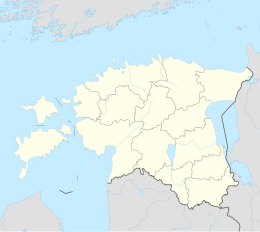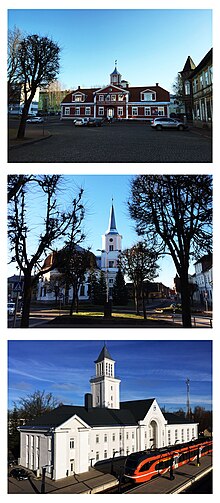Valga (Valga)
| Valga (Valga) | |||
|
|||
| State : |
|
||
| Circle : |
|
||
| Coordinates : | 57 ° 47 ' N , 26 ° 3' E | ||
| Height : | 65 m | ||
| Area : | 16.54 km² | ||
| Residents : | 14,055 (2004) | ||
| Population density : | 850 inhabitants per km² | ||
| Time zone : | EET (UTC + 2) | ||
| License plate : | G | ||
| Community type: | former municipality | ||
| Mayor : | Kalev Hark | ||
| Postal address : | Puiestee 8 68203 Valga |
||
| Website : | |||
|
|
|||
Valga (German Walk ) is a city in southern Estonia , 245 kilometers by road south of the capital Tallinn . In the course of the 2017 municipal reform, the municipality of Valga was dissolved and incorporated into the rural municipality of Valga .
Valga is right on the border with Latvia across from the Latvian sister city of Valka . Both cities formed a single city until 1920.
history
- For the history before 1920: see Walk
During the German occupation, between 1941 and 1944, Stalag 351 was set up for Soviet prisoners of war on the outskirts of Priimetsa in former horse stables , in which 30,000 people died. In Valga there was the Soviet POW camp 287 for German POWs of the Second World War .
In the times when Estonia and Latvia were part of the Soviet Union (1940–1941 and 1944–1991, respectively), border controls disappeared. After the collapse of the Soviet Union and renewed independence in 1991, customs barriers were again set up, which severely hindered the movement of people and goods between the two sub-towns. The border crossing for motorists was outside the two sub-towns. Since Estonia and Latvia joined the EU on May 1, 2004 and the Schengen Agreement was implemented on December 21, 2007, there is no longer any border clearance. Free movement of people and vehicles is possible throughout the city.
Culture
The Valgamaalane newspaper has been published three times a week since 1944 . In addition, Estonian television has a local representation and there is a local radio (“Raadio Ruut”). The Russian-language newspaper Walk (Валкъ) has been published since 2003 .
sons and daughters of the town
- Gerhardt Wilhelm von Reutern (1794–1865), Baltic German officer and painter
- Woldemar von Glasenapp (1812–1895), Vice Admiral of the Imperial Russian Fleet
- Piers Bohl (1865–1921), Livonian mathematician
- Albrecht von Ulmann (1871 – after 1902), opera singer (baritone)
- Jaan Kikas (1892-1944), weightlifter
- Alfred Neuland (1895–1966), weightlifter; became Olympic champion in weightlifting (lightweight) in Antwerp in 1920 and won a silver medal in Paris in 1924
- Paul Viiding (1904–1962), writer, literary critic and translator
- Alfons Rebane (1908–1976), officer in the Estonian army who later joined the Waffen SS
- Arnold Viiding (1911–2006), 1934 the first European champion in the shot put
- Kazimierz Świątek (1914–2011), Roman Catholic Cardinal and Archbishop Emeritus of Minsk-Mogiljow in Belarus
- Harri Asi (1922–2009), writer and poet
- Heinrich Schultz (1924–2012), Soviet-Estonian cultural functionary
- Uno Laht , pseudonym Onu Thal (1924–2008), poet, writer and translator
- Bruno Junk (1929–1995), Soviet athlete (walker) of Estonian origin, 1952 and 1956 Olympic medalist
- Heino Aunin (1935-2010), badminton player
- Tiit Vähi (* 1947), politician and entrepreneur
- Peeter Lilje (1950–1993), conductor
- Paul Varul (* 1952), politician and lawyer
- Olari Taal (* 1953), politician and entrepreneur
- Valeri Saar (* 1955), major general
- Piret Rips (* 1965), composer
- Marko Mihkelson (* 1969), politician
- Andrus Värnik (* 1977), athlete; won the gold medal in the javelin throw at the World Athletics Championships in Helsinki in 2005
- Jaan Jüris (* 1977), ski jumper and ski jumping trainer
- Triin Peips (* 1982), biathlete and cross-country skier
Town twinning
Valga cultivates friendly or partnership-based relationships
|
Individual evidence
- ↑ Maschke, Erich (Ed.): On the history of the German prisoners of war of the Second World War. Verlag Ernst and Werner Gieseking, Bielefeld 1962–1977.



